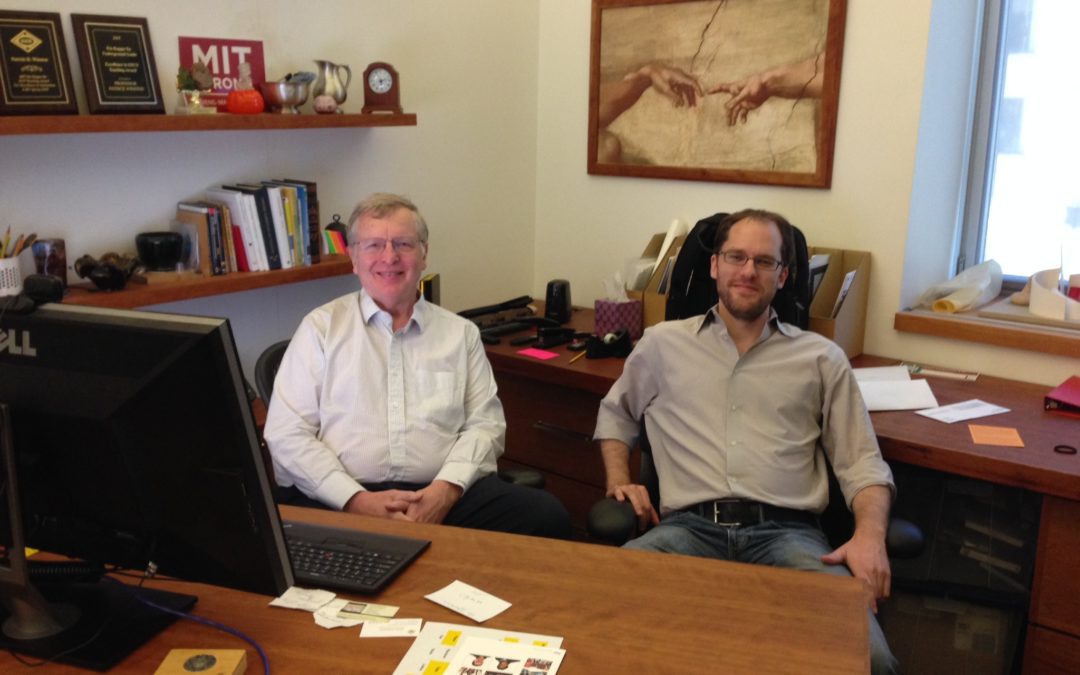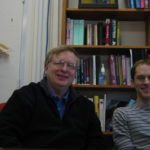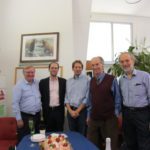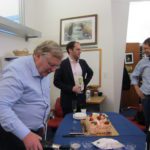By Mark Finlayson, Florida International University
“What do you say?” Patrick’s enunciated greeting would ring out, ritual-like, as I presented myself at the threshold to 32-251. His blond hair poking up from behind his monitor, I could hear in his voice whether he wore his characteristic wry smile. My visits were unscheduled: I would come over from my neighboring office when I saw his light on and door open. I spoke with him almost every work day for nearly twelve years, in conversations long and short, mostly about research: science, engineering, academics, artificial intelligence, cognition, or the latest paper or proposal we were writing. But we also ranged widely over topics personal and public. Now that I am a time-pressed faculty myself, I am increasingly amazed to recall his patience at my demands on his time. Despite sometimes him growling “Go away!” in mock anger (which meant he was working toward an impending deadline), he would almost always finish what he was doing and give his undivided attention. He became my touchstone for issues large and small, and the longer I spent with him, the more I marveled at the gems of wisdom I could extract during even the most minor discussions.
I first presented myself at Patrick’s door in the Spring of 2003, a young, intellectually lost doctoral student (and it was Patrick, not Pat—the latter was a woman’s name, he would say). I was casting about for where to go next, and I wasn’t sure that next stage involved a Ph.D. at all. But I conceived an interest in studying cognition and society from a computational point of view, and after a string of almost random connections, found myself at Patrick’s door. He told me, in no uncertain terms, that he was on the “lunatic fringe” of AI, and that I should go work with Tom Knight instead, who’s work in synthetic biology was really going somewhere. Nobody was interested in Patrick’s stuff; there was no funding.
As it turned out, there was funding, a lot of it; and there was a lot of interest, too. But that didn’t matter to me at the time, because in Patrick I had found exactly what I was looking for: not only a research advisor, working on fascinating science and driven by deep and important questions, but, more importantly, a mentor who could and would deliberately drive my intellectual and moral development. Someone who would challenge me, whom I could emulate, who would train me to think better and be better. Patrick was continuously thinking, synthesizing, exploring for a more unified perspective. He was driven by an inspiring vision, “to understand the computational nature of human intelligence”. He sought principles, and he was always on the lookout for the next powerful idea. He was a master communicator, orator, and teacher, with a genuine sense of humor and an ear for startling and effective turns of phrase. And he was also a captivating storyteller who used his own experiences, told with rich detail, to drive home his ideas and his lessons.
Just as importantly, however, Patrick was also deeply honest and morally steadfast, with a profound dedication to service. He was an MIT lifer, and when asked to introduce himself at professional gatherings, he would sometimes jokingly offer: “Hello, I’m Patrick Winston, at MIT. Before MIT, I was in high school.” He believed MIT was an institution that served a noble purpose for the nation and the world, and believed it should be held to a higher standard. He wasn’t afraid to criticize its leaders when he thought they had strayed. These convictions—the combination of moral clarity, sense of purpose, and scientific vision—made a deep impression on many in his orbit. I was no exception. When I left MIT in 2014 to continue in academia, Patrick’s inspiration and example stayed with me as an irreplaceable lodestar.
After I left we communicated frequently. He remained vigorous to the last, pursuing his research and teaching 6.034 to hundreds of students. A week before he died, on his sickbed yet expected to recover, speaking in barely a whisper due to weakness, he was instructing his newest doctoral student on the project he had for her. It was characteristic, him thinking and strategizing until the end, dying, as he would say, “with his boots on.” I had a list of questions waiting for when he recovered: there was still so much to learn, and I it’s hard to imagine him not there to learn it from.
I was privileged and fortunate to have sat at his feet for a dozen years. He was a singular and irreplaceable mentor, gone much too soon, and I will miss him dearly. I say: Thank you for everything, and safe travels, my friend.
- December 19, 2003 -In Patrick’s Office in NE43, right after submitting our first proposal together.
- May 11, 2011 – Celebration of my thesis defense outside of Patrick’s Office 32-251
- May 11, 2011 – Thesis Defense celebration



